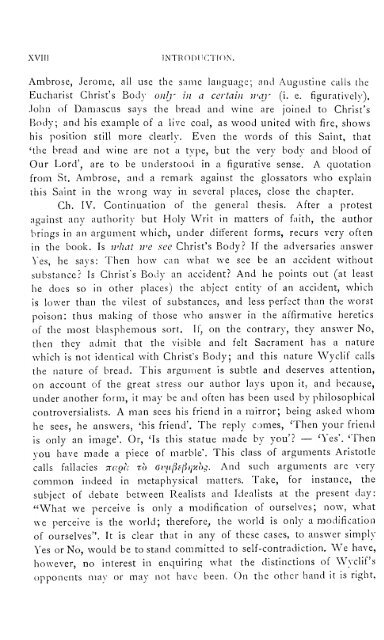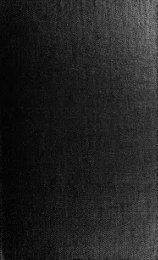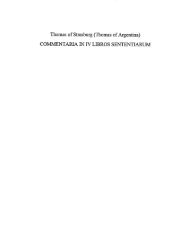Create successful ePaper yourself
Turn your PDF publications into a flip-book with our unique Google optimized e-Paper software.
XVIII INTRODUCTION.<br />
Ambrose, Jerome, all use the same language; and Augustine calls the<br />
Eucharist Christ's Body only in a certain way (i.<br />
e.<br />
figuratively).<br />
John of Damascus says the bread and wine are joined to Christ's<br />
Body; and his example of a live coal, as wood united with fire, shows<br />
his position still more clearly. Even the words of this Saint, that<br />
'the bread and wine are not a type, but the very body and blood of<br />
Our Lord', are to be un<strong>de</strong>rstood in a figurative sense. A quotation<br />
from St. Ambrose, and a remark against the glossators who explain<br />
this Saint in the wrong way in several places, close the chapter.<br />
Ch. IV. Continuation of the general thesis. After a protest<br />
against any authority but Holy Writ in matters of faith, the author<br />
brings in an argument which, un<strong>de</strong>r different forms, recurs very often<br />
in the book. Is what we see Christ's Body? If the adversaries answer<br />
Then how can what we see be an acci<strong>de</strong>nt without<br />
Yes, he says:<br />
substance? Is Christ's Body an acci<strong>de</strong>nt? And he points out (at least<br />
he does so in other places) the abject entity of an acci<strong>de</strong>nt, which<br />
is lower than the vilest of substances, and less perfect than the worst<br />
poison: thus making<br />
of those who answer in the affirmative heretics<br />
of the most blasphemous sort. If, on the contrary, they answer No,<br />
then they admit that the visible and felt Sacrament has a nature<br />
which is not i<strong>de</strong>ntical with Christ's Body; and this nature Wyclif calls<br />
the nature of bread. This argument is subtle and <strong>de</strong>serves attention,<br />
on account of the great stress our author lays upon it, and because,<br />
un<strong>de</strong>r another form, it may be and often has been used by philosophical<br />
controversialists. A man sees his friend in a mirror; being asked whom<br />
he sees, he answers, 'his friend'. The reply comes, 'Then your friend<br />
is only an image'. Or, 'Is this statue ma<strong>de</strong> by you'? — 'Yes'. 'Then<br />
you have ma<strong>de</strong> a piece of marble'. This class of arguments Aristotle<br />
calls fallacies Tiaga to 6v^s(h]xbg. And such arguments are very<br />
common in<strong>de</strong>ed in metaphysical matters. Take, for instance, the<br />
subject of <strong>de</strong>bate between Realists and I<strong>de</strong>alists at the present day:<br />
"What we perceive is only a modification of ourselves; now, what<br />
we perceive is the world; therefore, the world is only a modification<br />
of ourselves". It is clear that in any of these cases, to answer simply<br />
Yes or No, would be to stand committed to self-contradiction. We have,<br />
however, no interest in enquiring what the distinctions of Wyclif's<br />
opponents may or may not have been. On the other hand it is right,

















